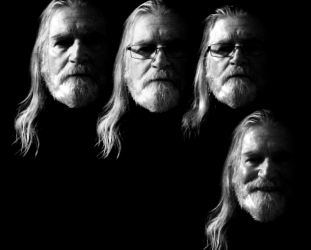Graham Reid | | 3 min read

When I started at the Herald in 1987, Peter Scherer was the editor. Those were the days before titles like Editor-in-Chief or Editor-at-Large.
Peter – who you could call by his first name – was simply the editor.
Or more correctly The Editor.
He was a remote figure to someone like me and I recall hearing little snippets about him: any aspiring journalist who wrote asking for a position at the Herald got their application binned without a reply if they spelled his name incorrectly; how he read every word of the paper every day and expected his journalists to do the same (I struggled with the racing section) and there would sometimes be an “editor's must” which seemed to mean you had to cover a particular topic.
That never happened to me because I was somewhere out on the wing and that kind of ball never came to me.
I mostly wrote about entertainment but after a couple of years they seemed to discover I could think and was pretty widely read, so I started covering more important things than rock stars and their opinions.
When that started to happen I would occasionally attend a weekly editorial meeting when the heads of departments would sit around and Peter would take them in turn, listening to what they were covering, any issues which had arisen and so on.
I well remember how he would be mostly silent, listen closely and then every now and again say something like, “wait until we get confirmation” or “push it back” or “let's see what the Minister has to say”.
He was just like Jason Robards in All the President's Men and I was impressed by such incisive thinking and witheringly accurate direction.
We rarely spoke or crossed paths but one day I was outraged by an article which had appeared and so took my concerns to the only place worth going: to Peter Scherer's very large office.
I was nervous but made my case uninterrupted and he listened attentively.
At the end of my presentation he said, “thank you Graham [long pause] and I will say to you what I say to our readers who come with their concerns. 'You may well be right.'”
And that was it.
I waited.
He said nothing more and I finally realised that was my cue to leave.
On one memorable occasion however he actually came to see me at my desk and complimented me on some story that I'd written. I can't remember which but it was an entertainment story so of little consequence in the grand scheme of things.
He said he admired how well written it was and was something our readers would appreciate.
I was a little dumbfounded but he stayed on and said, and I think these were close to his actual words, that what I did was valuable and that more fool him he had spent his journalism career writing “worthy” stories which largely went unread.
Recently I've been thinking about that because I have been so long out of the Herald that I'm sometimes seeing stories along the lines of what I wrote decades ago. Often about the same issue.
Despite my reputation as an entertainment writer I too wrote worthy stories: global famine, Islamic women terrorists, geopolitics and corruption in Taiwan, education, issues involving tikanga Maori, important authors, gay rights activists and so many more.
I spent two weeks in the Solomon Islands when there was a lull in the fighting and wrote two major pieces explaining why the conflict had come about and how it might be resolved. They won me the Media Peace Award.
I spent three weeks in Japan and interviewed everyone from Zen monks to old economists and smart software kids.
I suspect most of these went largely unread and are certainly long forgotten. And, being worthy, they changed nothing.
One day however when the Herald journalists were on strike I had a regular spot near the office handing our information to passersby and business people on their way to work. I would discuss our grievance with anyone who would listen, and an interesting thing happened.
A middle-aged, well-dressed businessman I'd see passing every day finally stopped and asked what it was all about. I explained the issues and he listened carefully, we discussed things for a bit and he took one of my flyers.
In words which sounded uncannily like what Peter Scherer had said some years before he told me that we journalists could well be right.
However as he walked away he turned back and said, “but you were wrong about that Clapton album”.
.
Peter Scherer edited the Herald for 11 years until 1996. He died in 2021.
.
These entries are of little consequence to anyone other than me Graham Reid, the author of this site, and maybe my family, researchers and those with too much time on their hands.
Enjoy these random oddities at Personal Elsewhere.




Steve - Apr 15, 2024
Love it!
Savepost a comment